Steven Pressfield's Blog, page 4
March 12, 2025
“Believe! Believe! Believe!”
I’m not sure where I saw this. It was a clip of Anthony Hopkins on some late-night talk show. The host asked, “If you had one piece of advice to give a young actor … or just a young person struggling these days, what would it be?”
Anthony Hopkins—the REAL Anthony Hopkins, not Hannibal Lecter—is a pretty cool guy, totally unpretentious and very available with a kind word and a helpful smile. He answered without hesitation and with great passion:
“Believe! Believe! Believe!”
Here’s another version of the speech that Anthony Hopkins delivered for the Class of 2020.
Anthony Hopkins message to the Class of 2020“Believe in yourself,” he said. Believe in your destiny. Believe in your capability.
Even if you must force yourself, Believe! See your dream realized and believe in it.
Even, Anthony Hopkins meant, when your own crazy mind (read Resistance) is beating you up with self-doubt, even when your friends and loved ones are undermining your self-confidence, even when there are truly legitimate reasons to question your project or your dream … peer in the mirror and tell yourself with all your heart, “You can do it! Believe! Believe! Believe!”
The post “Believe! Believe! Believe!” first appeared on Steven Pressfield.March 5, 2025
The Unlived Life
I started The War of Art with this thought:
Most of us have two lives. The life we live, and the unlived life within us. Between the two stands Resistance.

What does that mean? In the deepest metaphysical sense?
It means that our lives exist on two levels.
The first level is the material plane. The practical world. The level of kids and cars and mortgages and taxes.
The second is the plane of potentiality.
The unlived life within us.
The books we might write, the enterprises we might initiate, the realized self we might become.
Are you unhappy? Frustrated? Miserable? Do you engage in rants on Facebook and Twitter? Do you take your frustrations out on loved ones, rivals at work, shoppers in the produce aisle at Piggly Wiggly? Have you recently bought a gun? Are you looking for ways to move to Zamboanga?
I’m not saying things aren’t crazy out there.
I’m not saying that dark energies haven’t been loosed upon the world.
I’m as freaked out as the next guy.
But what I am saying is that some of our angst, some of our anguish comes not from the travails of the moment, however dire they may be, but from something deeper.
I mean the gap between our lived lives and our unlived lives.
I mean Resistance.
When you and I know … when we feel in our bones the unrealized self we are or could become and know that we’re not living it out … the result is pain. The result is shame and anguish and self-reproach.
What we hate is not our fellow citizens across the political aisle.
What we hate is our own failure to step up to that unlived level.
I’m not saying the time of action isn’t imminent. It may be inevitable that you and I, as citizens of a constitutional republic, will have to stand up and defend the principles our country stands for.
But when that fight is over and we find ourselves still as pissed off and miserable as we were before it started, we might remind ourselves that our deeper struggle—our “war of art”—is against that invisible, insidious, indefatigable negative force whose sole aim is to block the part of us that resides on the Material plane from reaching out and opening itself to the part of ourselves that participates in the Plane of the Potential.
The post The Unlived Life first appeared on Steven Pressfield.Most of us have two lives. The life we live and the unlived life within us. Between the two stands Resistance.
February 26, 2025
With the New Breed
The first critical hurdle in any home rebuild (I’m learning this now) is Debris Removal. In other words, getting rid of the mess that was your house. The way it seems to work is you can hire a private contractor and pay him … or the Army Corps of Engineers will do it for free. (If you have Debris Removal insurance, the Army Corps will be compensated by that.)

Today, Diana and I were up in our neighborhood along with some local friends who were also faced with rebuilding. We met with three officers—two Majors and a Captain—of the Army Corps. They had come to answer our questions and to relieve our concerns and anxieties. Here’s my takeaway:
First, all three were great guys and super-professional. The Army Corps of Engineers is apparently not some vast standing formation; it’s only eight hundred or so full-time military men. The primary work force is civilian contractors and heavy equipment operators hired on a job-by-job basis. These young officers were the core cadre. They organize and oversee the operation.
Our house—Diana’s and mine—is out in the boonies. Roads are narrow. There are rockslides and mudslides and retaining walls … it’s a hairy drive even in a civilian car, let alone at the controls of a 30-ton excavator that rolls on steel treads—not to mention the set-of-doubles haul trucks that must negotiate the same twists and switchbacks.
A young captain from Tennessee drove with us as we four-wheeled our way to our neighbor Jurgen’s property. I had never been there. It was like the Road to Mandalay, only narrower and steeper. Diana and I both turned to the captain. “Can your guys possibly get in here?”
“Oh yeah,” he said. “No problem.”
We asked him how.
“We’ll figure it out. That’s our job.”
If you’ve ever read E.B. Sledge’s classic WWII memoir, With the Old Breed, about the Marines on Peleliu and Okinawa, you know how much the young Eugene respected the vets of the Old Corps.
That’s how I feel about these new guys. I want to have their attitude. I want to be as cool as they are. I want to look at my own work and my own issues and be able to say, as that young captain did today, “We’ll figure it out. That’s our job.”
The post With the New Breed first appeared on Steven Pressfield.February 19, 2025
20% for New Business
When I first went to work as a neophyte copywriter in advertising, back in the Mad Men era, the thing that surprised me most was how much time was allocated (and required) by the agency for New Business.
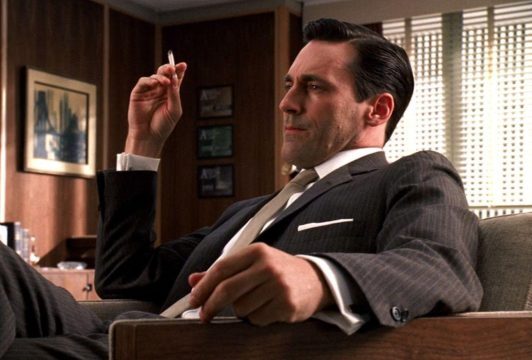 Jon Hamm as “Don Draper” in MAD MEN
Jon Hamm as “Don Draper” in MAD MENWhen we filled out our weekly time sheets, we had to show 20% at least under that heading. “New business” in agency terms meant pitching potential clients. (As a sidebar note, the same companies seemed always to be targets of New Business pitches—Burger King, Seven-Up, Avis Rent-a-Car.)
In other words, the agency—like every other business—was aware of attrition. Clients would dump us. To make up for this, we had to be constantly seeking new ones.
My boss and good friend Phil Slott (who was always very canny about stuff like this) observed that this principle applied in our personal and individual lives as well.
We too were always “losing clients,” he said. Shit happens. Losses roll in. Bad stuff shows up in our Inbox.
“The first reaction for most of us,” Phil said, “is to downsize. Cut back. Stop the bleeding. But the smart thing, even though it’s really hard, is to do the opposite. Do what the agency does—reach out aggressively and creatively, trying to bring in fresh action, something new to keep us excited and energized.”
I’m in that exact place now. Every bone in my body is screaming, “Trim your sails, pull back on all fronts, stop the outflow.”
But Phil is right. Hard as it is, we have to keep pushing forward, putting out new stuff, reaching beyond what our fear and self-doubt tell us is possible.
20% for New Business.
The post 20% for New Business first appeared on Steven Pressfield.February 12, 2025
Report From the Trenches #13
All prior reports in this series have been about battles with internal Resistance. This one’s about the real world.
First, thanks to everyone who has written in with kind wishes and good vibes. I never realized how many people were in my corner and looking out for me and Diana. Thanks to everyone!
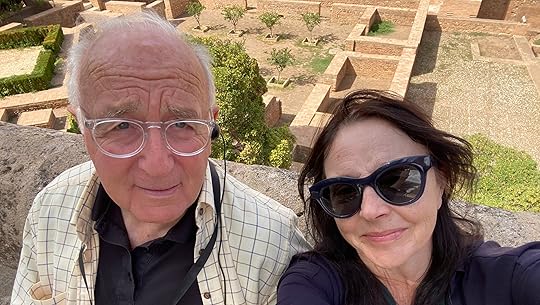
Here’s what’s been happening and where we stand:
After most of a month in hotels and friends’ guest houses, Diana and I have found an Airbnb in Venice. We’re safe and dry. There’s a place to write and it’s close to the gym—my two big mandatories.
We’re here for three months, meanwhile looking for something to rent longer-term—a year or two. Our plan is definitely to rebuild. May be crazy, as these fires are becoming a way-too-regular thing, but we love the place and we’re gonna go for it.
The hell of it is the bureaucracy and red tape. Despite govt promises to streamline the process, the grim reality is everybody does have to rebuild safely, on cleaned-up sites, according to code, etc. and that takes time. One of the most frustrating parts (and I’m sure this was true for Katrina or Lahaina or any other natural disaster) is the roads are closed. It makes sense of course because the infrastructure rebuild is so massive—power poles, drainage, clearance. The topography of New Orleans or Hawaii or here is that there are only a few roads in and out.
We’ve been up to see our house a couple of times. Everything is ashes down to the ground. The good news is the trees survived. We have two sycamores, a great old oak, and a massive eucalyptus that mean the world to us. They are scorched but they’ll be back.
Diana and I feel the same. I must thank as well not just the firefighters and first responders, who believe it or not are still here working, but the insurance people (at least the ones we’ve dealt with, at the CA FAIR Plan) and the hotel folks and so many others. At one point we checked in to the Huntley Hotel in Santa Monica. The reception dude who helped us (Daniel from Honduras) was so kind that Diana just started sobbing. Almost without exception, friends and strangers have been generous and supportive.
And don’t let me forget the Goddess. The Muse is there for all of us and nothing in the material world can touch her or her gifts. Keep digging, brothers and sisters. That underground river keeps flowing for all of us.
The post Report From the Trenches #13 first appeared on Steven Pressfield.February 5, 2025
Headwinds
A few years ago, after a surgery, I came home with two infections—staph and yeast. Without going into the gory details, the cure was fresh air on the site. Was this gonna knock me out of my working rhythm?
I wound up writing standing up, naked from the waist down, with an electric fan blowing on me.
The amazing part? I did some of the best work I’ve done in years.
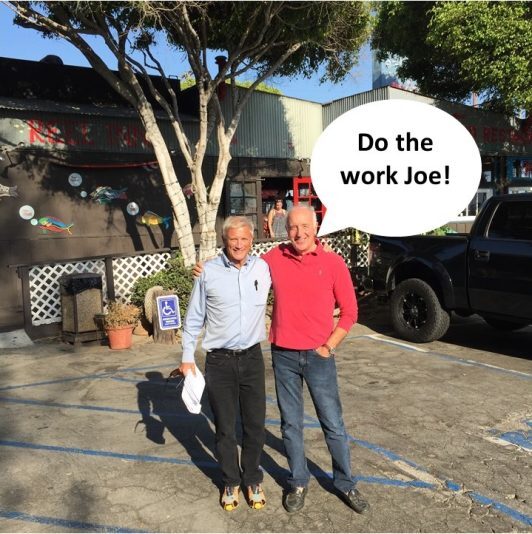 Me and my great friend Joe Tye outside the Reel Inn in 2022. Alas, the place is long gone in ’25.
Me and my great friend Joe Tye outside the Reel Inn in 2022. Alas, the place is long gone in ’25.You and I as writers and artists are always facing headwinds in our “real” life—caring for aging parents, a divorce, a lost job, illness, troubles with the kids. Not to mention the unrelenting and diabolical opposing gales of RESISTANCE.
But that underground river of creativity keeps flowing. It doesn’t know about our real-life problems. It has a life of its own. It wants to be brought forth into material existence. It’s as if we were pregnant with it, this new life inside us.
We have to serve it. One hour a day if that’s all we can squeeze in.
The payoff is that river saves us. It’s saving me right now in the aftermath of the California wildfires. I would be coming totally unpeeled if I didn’t carve out that one hour or two to DO THE WORK.
P.S. The electric fan did save the day.
The post Headwinds first appeared on Steven Pressfield.January 29, 2025
Frank Sinatra Does Not Move Pianos
This story (and the principle behind it) comes from my entrepreneur guru, Dan Sullivan. Thank you, Dan!
When Dan was in the army, his job was to book talent to entertain the troops. One of the singers he contracted was Frank Sinatra. Dan watched Frank work for several days. His big takeaway:
Frank Sinatra does not move pianos.
Frank does two things and two things only: he sings and he prepares to sing.
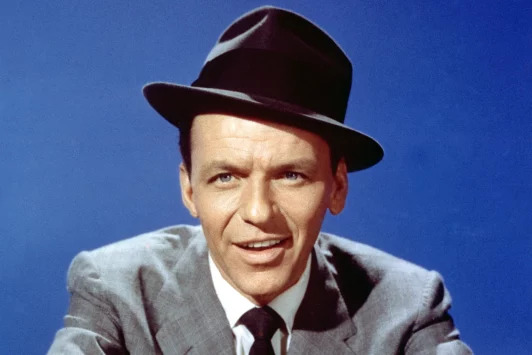
Dan applies this principle today to his coaching of high-end entrepreneurs, but it applies equally to you and me as writers and artists, meaning …
Concentrate on the one thing you do best and delegate everything else.
My own big realization about myself from getting burned out in the California wildfires: I’ve been living the Frank Sinatra life. I write and I prepare to write.
I’m not worth a damn at moving pianos.
This is not good, since now all I have to do is move pianos.
The weird part, when I think about the notes and emails I get from my fellow writers and artists, is that often they are GREAT at moving pianos … but they experience trouble when they try to sing and prepare to sing.
Do I have a solution? No. Do I even have a suggestion? Maybe.
I’m trying to switch my own brain into piano moving mode, at least for 50% of my day.
Maybe for all of us when we have trouble sitting down to our writing or our art … we should switch into Frank Sinatra mode, even if it’s only for one hour.
We don’t move pianos. We sing and we prepare to sing.
The post Frank Sinatra Does Not Move Pianos first appeared on Steven Pressfield.January 22, 2025
On Becoming More of a Prick
When Gates of Fire was first optioned by Universal Studios in 1998, the director Michael Mann was attached. I sent him hand-written congratulations and a signed first edition. I never heard a peep. I thought, “What a prick!”
 The all-time champ, Ming the Merciless
The all-time champ, Ming the MercilessThe same thing happened with Robert Redford on The Legend of Bagger Vance. Again I thought, “What a prick!”
But I gotta tell you, the more I’ve thought about it over the years, the more I see both Mann and Redford’s point of view.
They have to protect their time. Their assistants have to keep “asks” and potential “asks” at bay. Surely both directors thought, if in fact they ever got my packages, “Uh-oh, this writer’s going to be a major pain in the ass; the last thing I need on the set is some hyper-possessive literary type peering over my shoulder saying, ‘I would’ve shot that scene differently.’”
(Whether a movie director should meet with the writer of a book he’s adapting is a whole other question. Don’t get me started on that one.)
The bottom line on saying no to “asks” is this: if it’s okay to ask (and it is), then it’s okay to blow off an ask.
We’re not being pricks; we’re protecting our time.
The post On Becoming More of a Prick first appeared on Steven Pressfield.January 15, 2025
Chuck D. Tells It Like It Is
Here is Charles Dickens, rejecting an invitation from a friend.
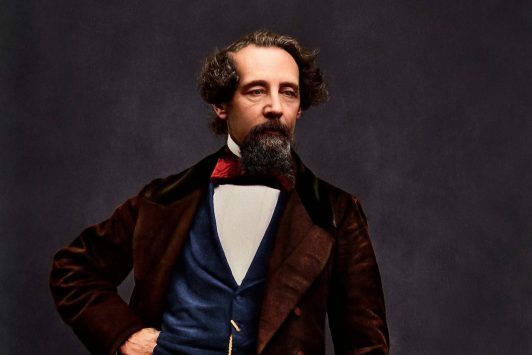
“‘It is only half an hour’–’It is only an afternoon’–’It is only an evening,’ people say to me over and over again; but they don’t know that it is impossible to command one’s self sometimes to any stipulated and set disposal of five minutes–or that the mere consciousness of an engagement will sometime worry a whole day…
Who ever is devoted to an art must be content to deliver himself wholly up to it, and to find his recompense in it. I am grieved if you suspect me of not wanting to see you, but I can’t help it; I must go in my way whether or no.”
Amen, brother.
I couldn’t have said it better myself.
The post Chuck D. Tells It Like It Is first appeared on Steven Pressfield.January 8, 2025
How the Big Boys Say No
Thank you, Tim Ferriss, from whose blog the excerpts below come from, and even bigger thanks to Kevin Ashton for writing it in the first place.

Here’s the piece:
A Hungarian psychology professor once wrote to famous creators asking them to be interviewed for a book he was writing. One of the most interesting things about his project was how many people said “no.”
Management writer Peter Drucker:
“One of the secrets of productivity (in which I believe whereas I do not believe in creativity) is to have a VERY BIG waste paper basket to take care of ALL invitations such as yours. Productivity in my experience consists of NOT doing anything that helps the work of other people but to spend all one’s time on the work the Good Lord has fitted one to do, and to do well.”
Secretary to novelist Saul Bellow:
“Mr. Bellow informed me that he remains creative in the second half of life, at least in part, because he does not allow himself to be a part of other people’s ‘studies.’”
Photographer Richard Avedon:
“Sorry–too little time left.”
Secretary to composer György Ligeti:
The post How the Big Boys Say No first appeared on Steven Pressfield.“He is creative and, because of this, totally overworked. Therefore, the very reason you wish to study his creative process is also the reason why he (unfortunately) does not have time to help you in this study. He would also like to add that he cannot answer your letter personally because he is trying desperately to finish a Violin Concerto which will be premiered in the Fall…”



